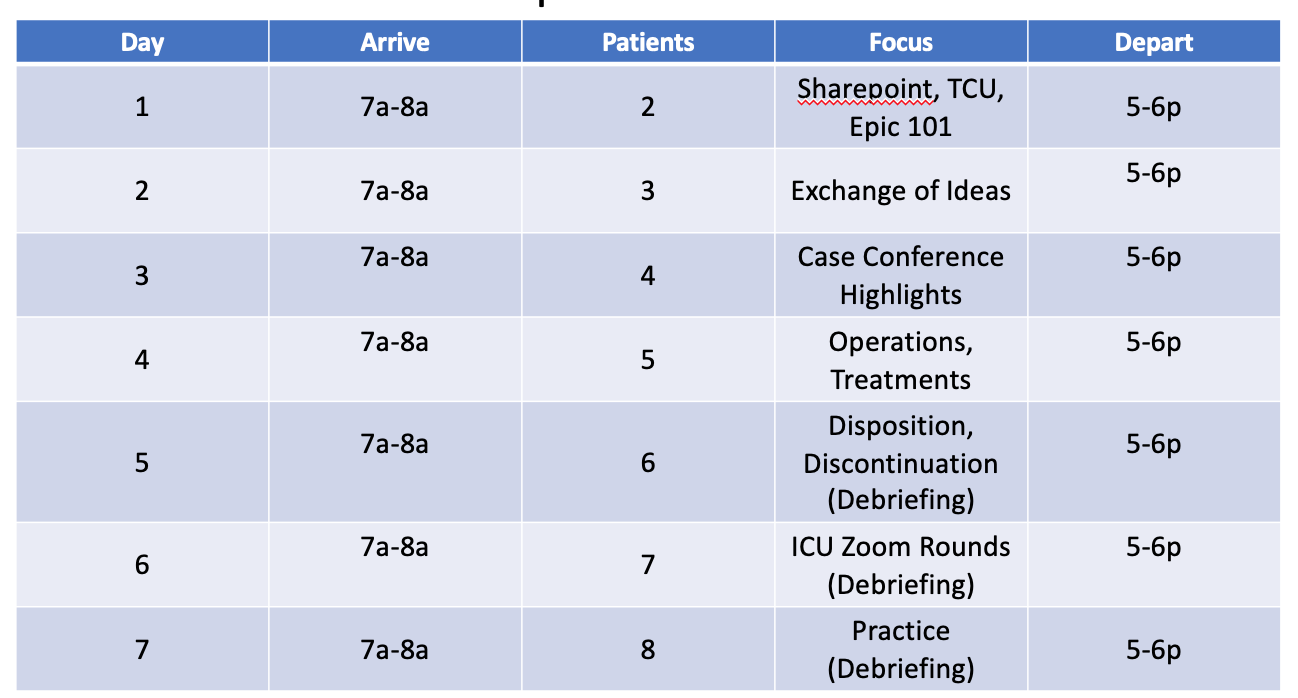Background: Hospital Medicine (HM) programs are struggling with providing care for existing patients while responding to multiple surges of COVID-19. The COVID crisis has challenged HM programs to learn and develop expertise in a new pathogen, while facing the emotional and social difficulties of being the primary responders to the pandemic. At our institution, the initial non-ICU spring and summer surges were handled exclusively by our HM team, which was starting to experience COVID fatigue and isolation. Accordingly, in anticipation of a heightened fall/winter surge (1), we sought volunteer physicians from other internal medicine specialties (CC IM physicians) to train to care for hospitalized COVID-19 patients alongside HM faculty.
Purpose: We developed ‘COVID Corps’ as a COVID-19 response program with the primary goal of creating capacity for a large, winter 2020-21, surge of COVID-19 cases. Secondary goals included preventing burn-out and preserving HM faculty ability to participate in non-COVID related missions such as attending on the medicine wards – considered paramount to morale and overall health of our HM team. Additionally, we aimed to improve relationships and camaraderie between CC IM faculty and HM faculty by collaborating and sharing in the battle of our era defining pandemic.
Description: COVID Corps was developed for volunteer CC-IM faculty interested in caring for patients hospitalized for COVID-19. In total, 11 faculty from a variety of fields including nephrology, cardiology, oncology, hepatology, GIM and internal medicine-pediatrics volunteered to participate. Interested faculty spent 5-7 days with HM faculty training in COVID care. Prior to starting the rotation, they received educational material and access to the HM COVID Sharepoint site (aka “COVID Central”).Non-HM IM faculty were then paired with HM faculty experienced in managing COVID-19. Over the course of the week, the HM faculty covered curricular components including COVID clinical course and care, infection prevention and epidemiology, and COVID operations (Table 1). After an initial shadowing day to orient to donning and doffing and the EHR, the CC IM faculty increased patient responsibility each day seeing from 3-6 patients daily.CC IM faculty were encouraged throughout the experience to provide their expertise in the management of COVID patients that are related to their field of practice. Towards the end of the week, CC HM and CC IM faculty reviewed a compilation of case studies. CC IM faculty also had the opportunity to attend COVID ICU multidisciplinary rounds. Table 2.
Conclusions: COVID Corps increased the confidence and competence of CC IM faculty in COVID care, creating capacity and camaraderie to combat a potential severe winter COVID surge. Of the 9 (of 11) pre-rotation survey responses, 0/9 (0.0%) felt they had adequate knowledge to care for COVID patients at bedside, and only 2/9 (22%) expressed confidence in applying or wearing PPE properly. In post-rotation surveys, 4/4 (100%) felt they had adequate knowledge to manage COVID patients at bedside (p=0.0294), and 4/4 (100%) expressed confidence in applying PPE (p=0.3348). As an added benefit, the program seemed to also encourage and improve interdepartmental camaraderie. As one CC IM faculty member attested,“Truly enjoyed my time working with the hospitalists, and meeting/talking to the intensivists. These groups of physicians have developed a refined expertise in the care of these patients and bring a level of dedication that is inspiring.”


